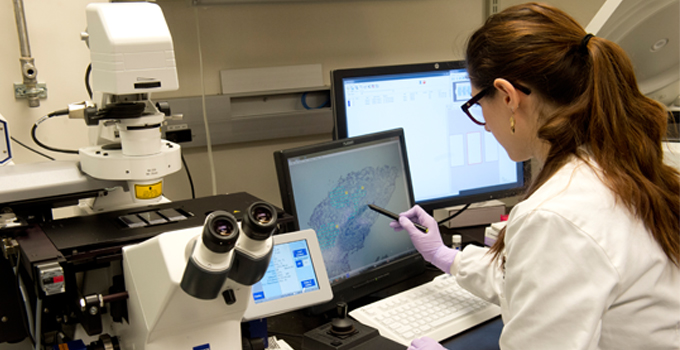
Ontario Molecular Pathology Research Network (OMPRN) helps establish new training standards for pathologists across Canada
Personalized medicine presents a tremendous opportunity for molecular pathologists to contribute to improvements in detecting, diagnosing and selecting treatments for cancer patients. As new diagnostic and prognostic tools continue to emerge, it is becoming increasingly important for pathologists to engage in cancer research and understand new developments across scientific disciplines. Fostering this engagement begins with education.
OMPRN is championing the advancement of molecular pathology training across Canada through its engagement with the Royal College of Physicians and Surgeons of Canada (Royal College), Canada’s governing body for medical education. Together, they are developing a new curriculum for pathology residents based on competencies – the proficiency or ability to perform a skill – rather than the traditional time-based training approach where residents are evaluated based on the amount of time spent acquiring knowledge or practicing a skill.

“The existing competencies around molecular pathology were not adequate in detail, nor were they adequate in rigour,” says Dr. David LeBrun, Principal Investigator at Queen’s Cancer Research Institute and Leader of OMPRN. “So we harnessed the opportunity to improve these training standards for the future of pathology in Canada.”
OMPRN developed a list of molecular pathology competencies, priorities and training strategies to inform a new national curriculum. These suggestions were presented to the Anatomical Pathology Specialty Committee of the Royal College, who accepted several of the proposed strategies and recognized OMPRN’s submission as an official Royal College Curricular Document – a curriculum guide for educators.
One of OMPRN’s major contributions to the new curriculum, which is currently being implemented across Canada, was a competency focused on synthesizing a unified, clinically-actionable report based on results from non-traditional diagnostic tests, such as liquid biopsies or genomic profiling. With this ability, pathologists can better inform clinicians while ensuring that there are no opportunities missed in the detection or diagnosis a patient’s disease.
“With proper training, pathologists can play a key role in bringing the benefits of new research discoveries into the patient experience,” says LeBrun. “These competencies will help ensure that treatment decisions in the clinic are well informed by both conventional pathology techniques and novel tools and resources.”
One of the key challenges of competency-based education is that some training centres may not have the expertise to train their residents on highly-specialized skills. OMPRN is working to address the gap in expertise by developing online education materials to complement the molecular pathology competencies and offering training courses like their inaugural Applied Molecular Pathology Course, which was held January 9-10 in Mississauga.
“Our mission is to create a vibrant community of cancer research-oriented pathologists in Ontario,” says LeBrun. “Through our educational initiatives, OMPRN is helping to build the next generation of pathologists and – in turn – driving the future of cancer innovation.”
For more information on the Ontario Molecular Pathology Research Network, please visit its website.
Learn more about the Royal College’s Competence by Design program in the video below.
